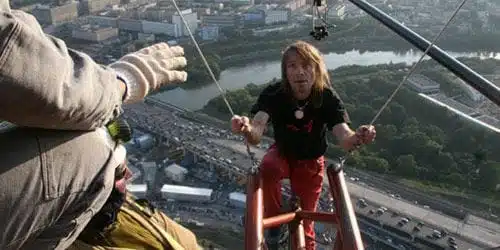
On 6 June, Alain Robert scaled the 50-story New York Times building. The feat drew massive media and police attention; such things aren’t supposed to happen in broad daylight in post-9/11 Manhattan, after all. And then, incredibly, just a couple of hours later, a second man, Renaldo Clarke climbed the same building. The doubling up was certainly embarrassing for law enforcement. It also raised a question: just what is it that’s so gripping about building-climbing stuntmen?
Your answer to this question might shape your response to The Human Spider, a BBC documentary on the French urban free solo climber Alain Robert, premiering on BBC America 29 June. Narrated by Ewan MacGregor, the movie covers a lot of biographical ground in a very short time: Robert has been climbing since childhood, perhaps in an effort to break free of a life “filled with strict rules and regulations.” To date he has climbed over 85 of the world’s tallest “mega-structures,” so termed because they range from buildings to bridges. By way of vague set-up, professional climber Neil Gresham intones, “The thing about doing this type of climbing is that a lot of it is about kind of manufacturing this very confident mind-state.”
Indeed, this seems to be the central observation concerning Robert: he is supremely self-confident. The film follows his exploits Robert for about a year, encompassing five climbs, in Berlin, Shanghai, Lisbon, Moscow, and London. Each presumably involves careful preparations, though the documentary doesn’t delve into any planning. Instead, it drops into each city alongside Robert, as if the stunt has been conceived at a last minute. Robert talks to the camera comfortably, an acutely self-aware performer. As he notes the weather (usually, that the wind is “fucking strong”), each episode is rendered with big-boomy zooms and percussive soundtrack, an aesthetic that recalls World’s Wildest Police Videos. Robert makes a run across a sidewalk or up a stairway to mount the building, and then he ascends — netless, cableless, and apparently fearless.
While the film notes that he is paid for his (illegal) work — corporations pay him to hang banners, as was the case in New York — it also underscores the danger he faces, and for the most part, the film presents his efforts as if they speak for themselves, as if he stands apart from his audience, rendered here as either far-away gapers with cell-phone cameras or local police arriving on the scene with blaring sirens blaring and necessarily inapt take-down tactics.
The film’s narrative structure is hardly subtle. As Robert confesses he was for a long time afraid of heights, sports psychologist Tim Woodman appears on screen with the ready quotation: “A phobia is a fear of something, a counter-phobia is deliberately putting yourself in a situation where you are going to experience fear, to overcome a fear that is deep-seated.” While this superficial analysis explains nothing about this particular individual, it does initiate a rudimentary framework for his behavior — which often seems less dare-devilish than inexplicable. In China, he runs out of the medication he takes for epilepsy (developed after one particular bad fall in 1982), then can’t communicate with the man he’s sent in search of a prescription. Alas, Robert huffs, he’ll have to go ahead without the medication.
A more sustained sort of slapdashery informs his marriage, at least as it’s presented by The Human Spider. Married for some 25 years, he frequently leaves his wife Nicole and sons home while he heads off on adventures, complete with camera crews (who have kept a visual record of his feats) that keep him away for weeks at a time. “I’m looking for a world that’s full of danger,” Robert pronounces, “And not a kind of world completely living in a bubble where everything is so safe, secure.” Just so, he argues with Nicole about smoking, suggesting that he “manages risk,” while her intake of tar and nicotine is all risk, no management.
The couple’s interactions function as brief interludes in the film, between stunts, but these — long with a couple of brief interviews with sons Hugo and Lucas — are more compelling than the repetitive rhythms of the climbs. As they sit at a dining table, not looking at one another but instead at the camera, she says, “You can’t take care of your kids’ education if you’re never here. You can’t do it by phone, you know.” He smiles, asserting that as long as his sons are doing what they want, he’s done his job. To hear 17-year-old Hugo tell it, Robert is “not like other fathers.” He says, “Although he is my father, he is cool… He never barks at me to tell me off. He is my mate.” Younger son Lucas tells his interviewer it’s a “stupid question” to wonder whether he worries about his father’s work. “Of course I’m scared my father might fall,” he sighs, “It’s normal.” For him, maybe.
